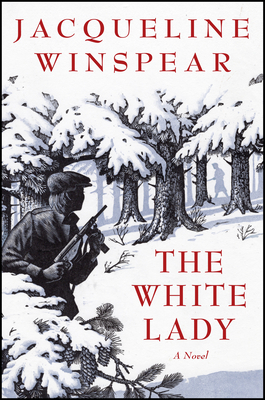 The White Lady by Jacqueline Winspear
The White Lady by Jacqueline Winspear Format: eARC
Source: supplied by publisher via Edelweiss
Formats available: hardcover, paperback, large print, ebook, audiobook
Genres: historical fiction, historical mystery, mystery, World War I, World War II
Pages: 352
Published by Harper on March 21, 2023
Purchasing Info: Author's Website, Publisher's Website, Amazon, Barnes & Noble, Kobo, Bookshop.org, Better World Books
Goodreads
The White Lady introduces yet another extraordinary heroine/sleuth from Jacqueline Winspear, creator of the best-selling Maisie Dobbs series. This heart-stopping adventure follows the coming of age and maturity of former wartime operative Elinor White—veteran of two wars, trained killer, protective of her anonymity—when she is drawn back into the world of violence she has been desperate to leave behind.
A reluctant ex-spy with demons of her own, Elinor finds herself facing down one of the most dangerous organized crime gangs in London, and exposing corruption from Scotland Yard to the highest levels of government.
Post-World War II Britain, 1947. Forty-one-year-old “Miss White," as Elinor is known, lives in a village in Kent, England, so quietly and privately as to seem an enigma to her fellow villagers. Well she might, as Elinor occupies a "grace and favor" property, a rare privilege offered to faithful servants of the Crown for services to the nation. But the residents of Shacklehurst have no way of knowing how dangerous Elinor's war work had been, or how deeply their mysterious neighbor continues to be haunted by her past.
It will take the child of Jim Mackie, a young farmworker and his wife, Rose, to break through Miss White's icy demeanor—but Jim has something in common with Elinor. He, too, is desperate to escape his past. When the powerful Mackie crime family demands a return of their prodigal son for an important job, Elinor assumes the task of protecting her neighbors, especially the bright-eyed Susie, who reminds her of the darkest day of her life.
Elinor’s wartime training and instincts serve her well, but as she endeavors to neutralize the threat to Jim, Rose and Susie Mackie, she is rapidly led along a tunnel of smoke and mirrors in which former wartime colleagues – who know the truth about what happened in 1944, and the terrible event that led to her wartime suicide attempt – are compromised by more powerful influences.
Ultimately, Elinor will hold a gun to the head of a Mackie crime lord to uncover the truth behind the family's pursuit of Jim, and in doing so, reveal the far-reaching tentacles of their power—along with the truth that will free Elinor from her past.
My Review:
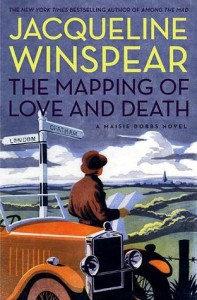 For the past several years of her cases (since The Mapping of Love and Death) March has been the month of Maisie. Maisie Dobbs, that is.
For the past several years of her cases (since The Mapping of Love and Death) March has been the month of Maisie. Maisie Dobbs, that is.
Which means that all of Maisie’s fans and friends are pretty much primed for a book every March filled with Maisie’s inimitable style of detection and the combination of found and birth family that she has gathered around herself to help her both solve her cases and live a life that combines danger and intrigue with a intense insight into the human nature that has created the situations in which she regularly finds herself.
Maisie seems to have taken a vacation this March, and in her place we have Elinor White, who both is and is not the ‘White Lady’ of the title.
Elinor’s story is told in two timeframes, both her present in 1947 and the past that led her there, from her childhood in occupied Belgium through her wartime service in the top-secret Special Operations Executive to the point where her past meets her present after the war.
We first meet 1947 Elinor, a middle-aged spinster living in a ‘grace and favor’ cottage in Kent. That cottage was granted to her for her lifetime for services rendered to the crown in both wars, and it’s what those services consisted of that makes up the past we have to see, and the lessons Elinor has to learn, before the person we met in 1947 comes fully into focus.
And then shatters when she learns that what she believed was the worst crime she ever committed was nothing that she did at all. The crime was committed by someone she believed was a friend and an ally. Although she is certainly the one who paid for it then, and very nearly does again.
It’s only after the smoke clears, quite literally, that Elinor White may be able to step forward into a future that holds more than waiting for fate to catch up to her and make her pay for all the wrongs she committed in the name of a greater purpose.
If she can set aside the necessary cautions that come from having survived not one but two wars as a spy and saboteur.
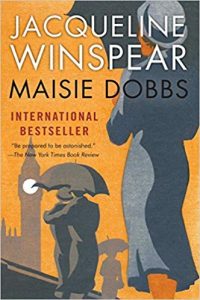 Escape Rating B: I ended this book with a LOT more mixed feelings than I expected going into it. I enjoy the Maisie Dobbs series because I find the history interesting, Maisie’s perspective fascinating, and the story as a whole absorbing. I like the characters and more importantly I CARE about them every bit as much as I care about seeing the solution of the mystery.
Escape Rating B: I ended this book with a LOT more mixed feelings than I expected going into it. I enjoy the Maisie Dobbs series because I find the history interesting, Maisie’s perspective fascinating, and the story as a whole absorbing. I like the characters and more importantly I CARE about them every bit as much as I care about seeing the solution of the mystery.
It’s the care that was missing in my reading of The White Lady. The history was every bit as fascinating as I was expecting from this author. While Britain’s Special Operations Executive and the women who served as agents in it have appeared in an increasing number of stories lately – as have the women of Bletchley Park – Elinor’s experiences as an agent of La Dame Blanche – the Belgian resistance in World War I funded by Britain – were new to me. Her experiences in the Belgian Occupation, when she was just barely into her teens, were searing and absorbing.
But something about those experiences feels like it set Elinor herself just a shade apart from real life – or at least from her own real life. She seems so used to keeping herself utterly guarded – a necessity during the war that kept her alive – that she remains just a touch removed from the life we read about in this story. It makes it difficult to know her well enough to care about her character.
I didn’t feel invested in her journey and it kept me from being absorbed in the story.
Which doesn’t mean that parts of it were not fascinating, because her surprising – to herself most of all – foray into a police investigation of the criminal gangs controlling vast swaths of London had the potential for chills and thrills – and delivered them as well as a bit of schadenfreude that the men who thought they knew everything – both among the police and among the criminals – discovered they were wrong, wrong, wrong. And still weren’t convinced they’d been hoodwinked by a gang of women. Or that a woman figured out the real crime being planned while all the experienced detectives dismissed her at every turn.
In the end, I liked The White Lady but didn’t love her. I’m glad I read this one but not disappointed that it appears to be a standalone title and not the start of a new series. I hope we see Maisie again next March – or whenever her next adventure appears.

 The Cliff's Edge (Bess Crawford #13) by
The Cliff's Edge (Bess Crawford #13) by 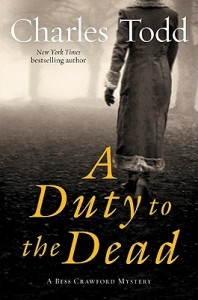 The cliff’s edge of the title is both literal and figurative in this 13th entry in the
The cliff’s edge of the title is both literal and figurative in this 13th entry in the 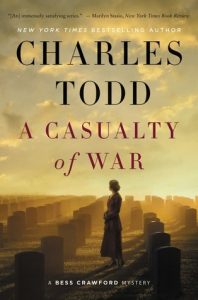 Escape Rating B-: As much as I have enjoyed this series, I believe that it is time for it to come to an end unless it makes a major change in direction. Because Bess has been in limbo for several entries now – at least since book 10,
Escape Rating B-: As much as I have enjoyed this series, I believe that it is time for it to come to an end unless it makes a major change in direction. Because Bess has been in limbo for several entries now – at least since book 10,  So Bess is in Yorkshire in the midst of this case, which is quite a muddle that doesn’t seem much clearer at its end. Not that the cause of the whole thing isn’t found, but rather that the solution isn’t terribly cathartic and doesn’t seem to resolve much of the surrounding tension.
So Bess is in Yorkshire in the midst of this case, which is quite a muddle that doesn’t seem much clearer at its end. Not that the cause of the whole thing isn’t found, but rather that the solution isn’t terribly cathartic and doesn’t seem to resolve much of the surrounding tension.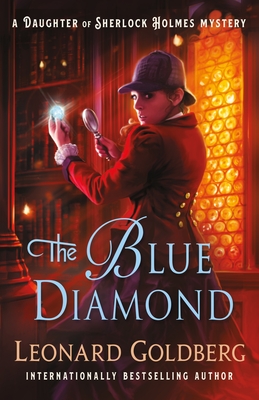 The Blue Diamond (The Daughter of Sherlock Holmes Mysteries #6) by
The Blue Diamond (The Daughter of Sherlock Holmes Mysteries #6) by  Up until this entry of this series featuring Joanna (Holmes) Blalock Watson, the
Up until this entry of this series featuring Joanna (Holmes) Blalock Watson, the 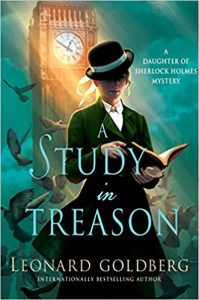 Escape Rating B: This series always gives me mixed feelings. Probably because at least within the confines of my own head, it is in dialogue with two other series (
Escape Rating B: This series always gives me mixed feelings. Probably because at least within the confines of my own head, it is in dialogue with two other series (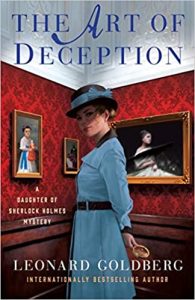 The case she has to solve here is every bit as contrived and convoluted as any that her father faced. But at least this one is hers, born out of the war the world is facing in her time and not his. This feels like a step forward for the series so I’m glad to see it.
The case she has to solve here is every bit as contrived and convoluted as any that her father faced. But at least this one is hers, born out of the war the world is facing in her time and not his. This feels like a step forward for the series so I’m glad to see it.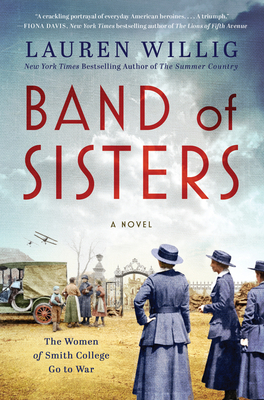 Band of Sisters by
Band of Sisters by 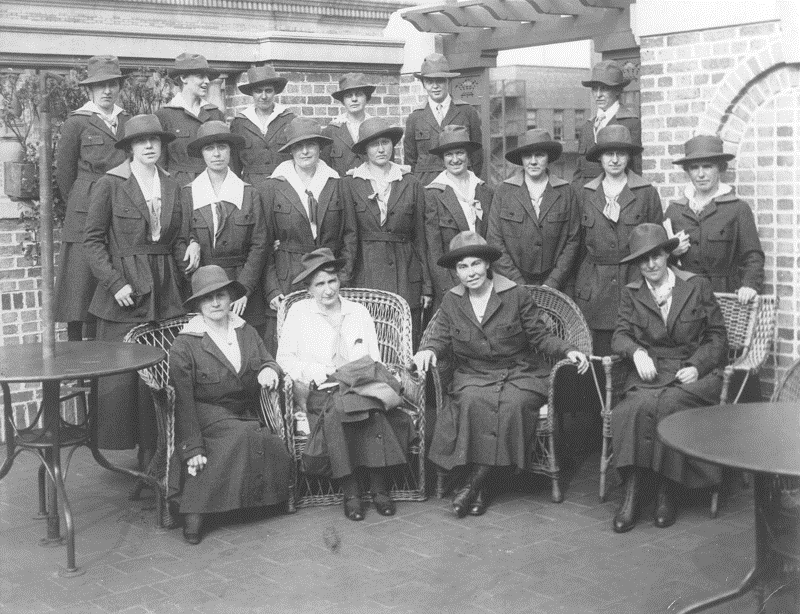
 Sisters of the Great War by
Sisters of the Great War by 
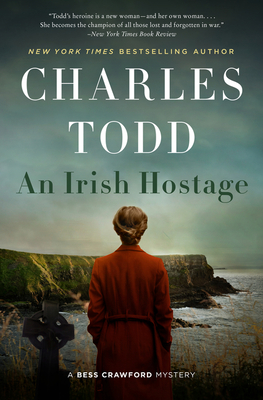 An Irish Hostage (Bess Crawford #12) by
An Irish Hostage (Bess Crawford #12) by 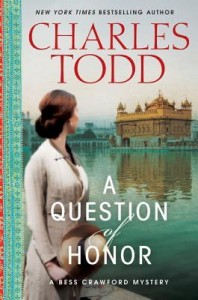 Escape Rating A-: The story in An Irish Hostage feels close and tight, and that’s probably the way it should be. There are huge issues on the horizon, and in the story, and most of them are too big for Bess to solve. She’s stuck, inside tiny, hostile Killeighbeg, caught in the web of the Flynn household, and trapped entirely too often inside her own head.
Escape Rating A-: The story in An Irish Hostage feels close and tight, and that’s probably the way it should be. There are huge issues on the horizon, and in the story, and most of them are too big for Bess to solve. She’s stuck, inside tiny, hostile Killeighbeg, caught in the web of the Flynn household, and trapped entirely too often inside her own head. Beauty Among Ruins by
Beauty Among Ruins by 
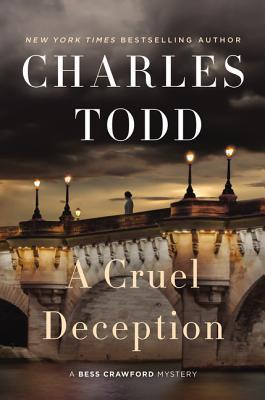 A Cruel Deception (Bess Crawford, #11) by
A Cruel Deception (Bess Crawford, #11) by  Escape Rating B: As I said at the top, this is a story about being in limbo. There are just too many things that are very much up in the air, and Bess’ investigation into Minton’s circumstances are just one of the many, many things that are hanging.
Escape Rating B: As I said at the top, this is a story about being in limbo. There are just too many things that are very much up in the air, and Bess’ investigation into Minton’s circumstances are just one of the many, many things that are hanging.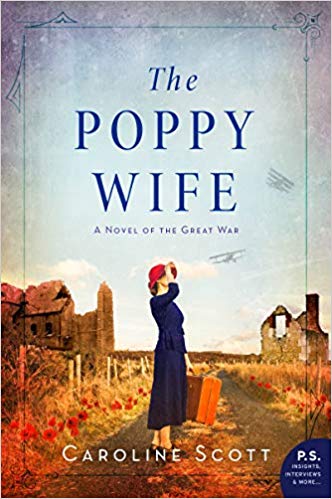 The Poppy Wife: A Novel of the Great War by
The Poppy Wife: A Novel of the Great War by 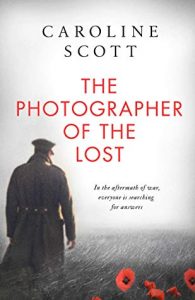 So Edie asks Harry to look, again, for Francis. Not that Harry hasn’t looked plenty of times before – and not just for Francis. After all, it’s Harry’s job to go to the battlefields and graveyards and photograph the graves, the artifacts, and the ruins. He is the photographer of the lost. (This book was originally published in the U.K. under that title,
So Edie asks Harry to look, again, for Francis. Not that Harry hasn’t looked plenty of times before – and not just for Francis. After all, it’s Harry’s job to go to the battlefields and graveyards and photograph the graves, the artifacts, and the ruins. He is the photographer of the lost. (This book was originally published in the U.K. under that title,  Death in Focus (Elena Standish #1) by
Death in Focus (Elena Standish #1) by